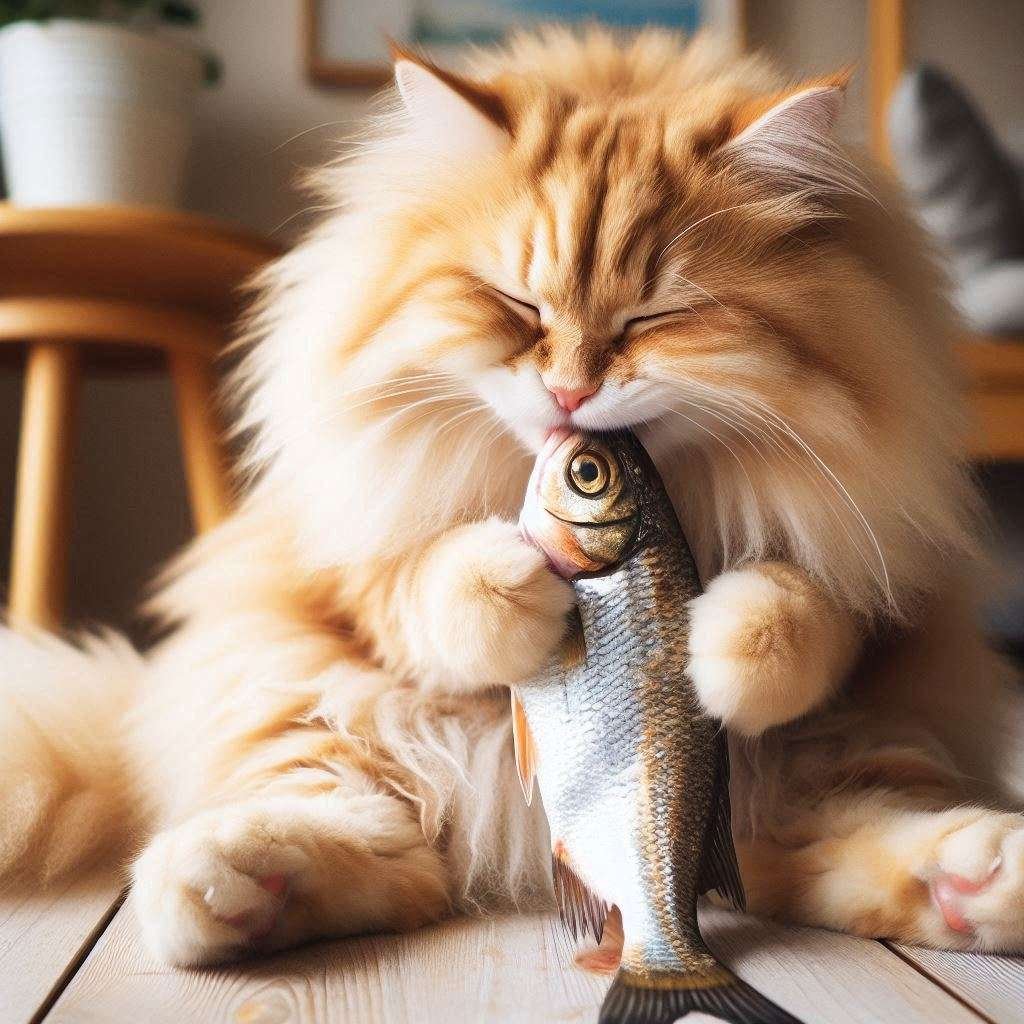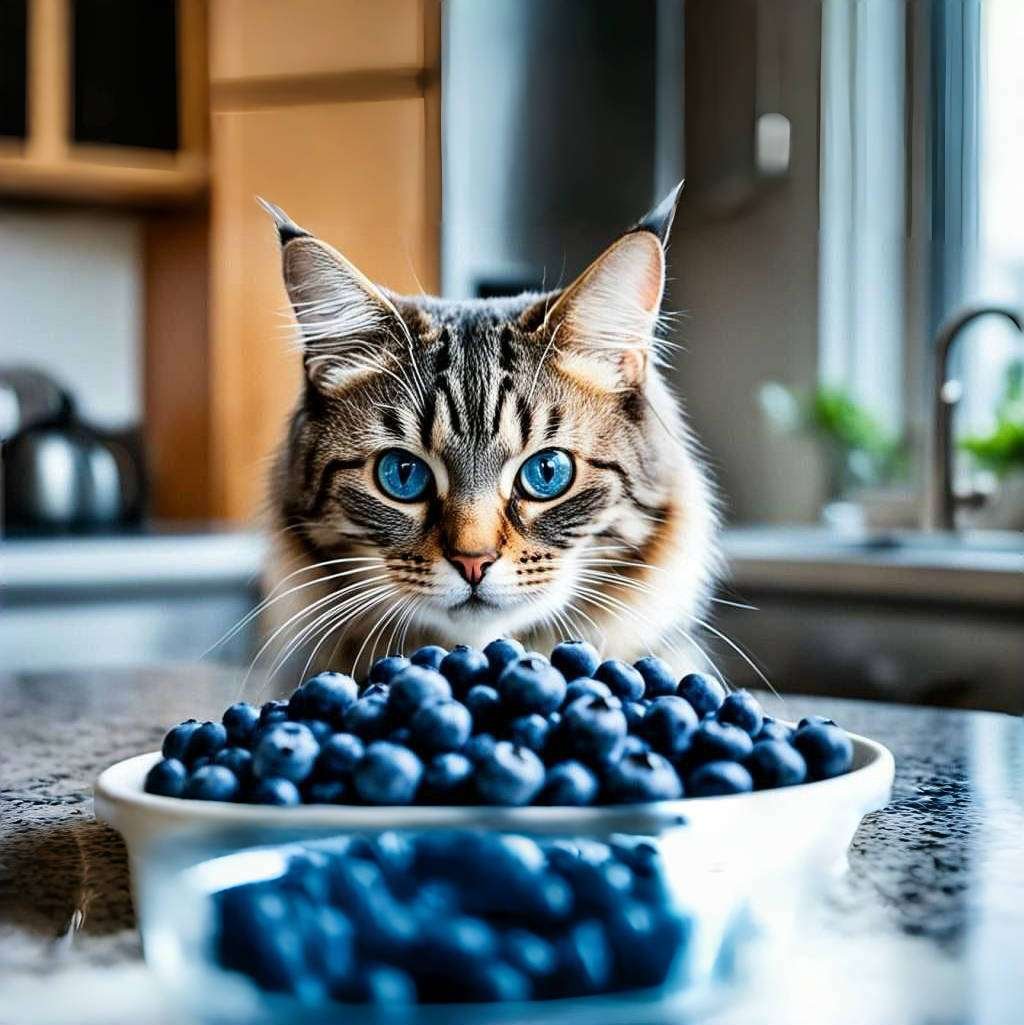As a cat owner, you might want to share peanut butter with your pet or wonder can cats eat peanut butter? But first, you need to know the risks. Peanut butter isn’t toxic to cats, but it’s not safe either. It doesn’t offer any health benefits and can harm your cat’s health.
Cats are meant to eat meat, not plants. So, peanut butter can upset their stomachs. They might vomit, have diarrhea, or feel sick. Some cats could even have an allergic reaction, leading to swelling, itching, and losing weight.
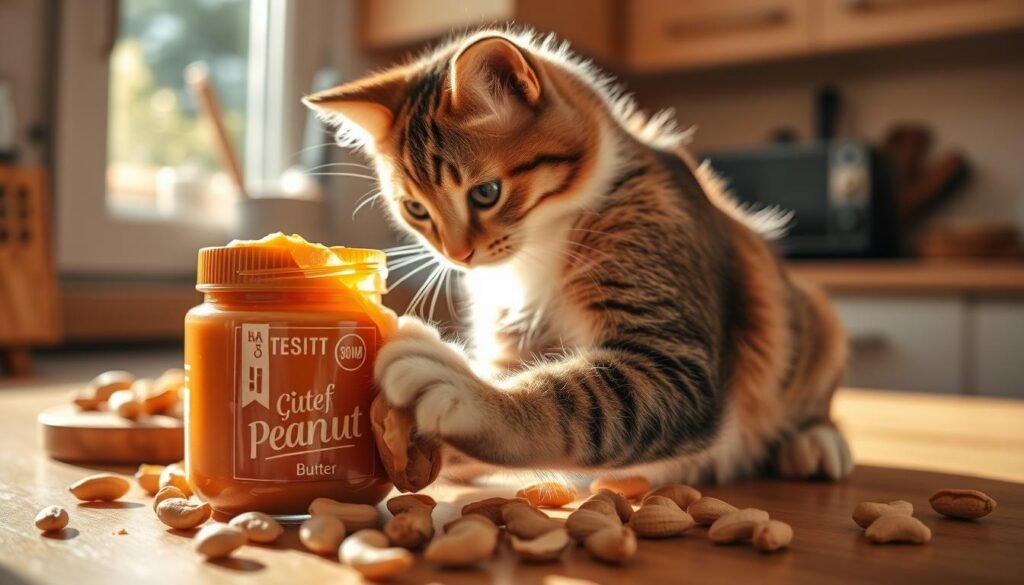
Key Takeaways:
- Peanut butter can cause gastrointestinal issues in cats, including vomiting, diarrhea, gas, and stomach pains.
- Cats may develop allergic reactions to peanut butter, leading to symptoms like facial swelling, severe itching, and weight loss.
- Certain ingredients in peanut butter, such as xylitol, can be toxic to cats, causing hypoglycemia and liver failure.
- Peanut butter can present a choking hazard due to its thick and sticky texture.
- Cats should not develop a taste for peanut butter due to potential health risks like obesity, diabetes, and exposure to contaminants.
Understanding Cats and Their Nutritional Needs
Cats are obligate carnivores, meaning they need animal-based proteins more than plant-based foods. This is different from humans, who can eat both animal and plant foods. This unique need makes cats special.
Why Cats Are Obligate Carnivores
Cats have a digestive system made for meat. They can’t break down plant fibers like peanut butter well. So, cats and peanut butter don’t mix well, as cats can’t get the good stuff from it.
Essential Nutrients for Feline Health
Cats need a diet full of animal proteins, fats, and certain vitamins and minerals. They need taurine, arachidonic acid, and vitamin A for their organs, eyes, and immune system. Giving them the right food is key to their health.
The Role of Treats in a Cat’s Diet
- Treats should not be more than 10% of a cat’s daily calories for a balanced diet.
- Peanut butter for cats might look appealing, but it’s not nutritious and can cause weight gain or health problems if eaten too much.
- Good pet owners should give their cats the right feline peanut butter diet most of the time. Treats should be rare, used for positive reinforcement and fun.
“Feeding a diet that meets a cat’s specific nutritional requirements is crucial for their overall health and well-being.”
Can Cats Eat Peanut Butter?
Technically, cats can eat peanut butter in small amounts. But it’s not a good idea to make it a regular treat. Peanut butter doesn’t offer any nutritional benefits for cats and can cause health problems if eaten too much. Some cats might like the taste, but others won’t care. It’s best to stick with cat food made just for them.
Peanut butter isn’t toxic to cats, but it might have xylitol. Xylitol is very bad for dogs and can harm cats too. It can cause low blood sugar and liver damage in dogs. Cats, being meat-eaters, don’t do well with peanut butter’s carbs.
Treats, like peanut butter, should not make up more than 10 percent of a cat’s daily food. Too much salt in peanut butter can upset a cat’s stomach. Too much sugar can lead to heart problems, weight gain, and diabetes.
Feeding cats human food, like peanut butter, can make them beg and snatch food. This can be dangerous because they might eat things they shouldn’t. Peanut butter is safe for healthy cats, but how much they can handle varies. It’s best to give it to them only sometimes and in small amounts. Most of their food should be cat food made just for them.
Nutritional Value of Peanut Butter for Cats
Peanut butter might look like a tasty snack for cats, but it’s not good for them. Cats need animal proteins to stay healthy, but peanut butter has plant-based proteins and fats. These are hard for cats to digest.
Protein and Fat Content
Peanut butter has lots of protein and fat, which are good for humans but not cats. Cats can’t easily digest the plant-based proteins and fats in peanut butter. This can cause health problems like obesity, diabetes, and pancreatitis.
Vitamins and Minerals
Peanut butter has some vitamins and minerals like folate, biotin, copper, and phosphorus. But these are not as good for cats as they are for humans. Cats need specific vitamins and minerals from meat to stay healthy.
Caloric Considerations
One tablespoon of peanut butter has about 100 calories. This is a big part of a cat’s daily calories. Giving cats too many high-calorie treats can make them gain weight and get sick.
| Nutrient | Amount in 1 Tbsp Peanut Butter | Relevance for Cats |
|---|---|---|
| Protein | 3.6 g | Cats require animal-based proteins for optimal health. |
| Fat | 8 g | High-fat content can be detrimental to cats’ health. |
| Calories | 95 kcal | A significant portion of a cat’s daily caloric needs. |
In short, peanut butter is not a good treat for cats. Meat-based treats like cooked chicken, turkey, tuna, or salmon are better for them.
Safety Concerns and Health Risks
Peanut butter might seem like a safe snack for cats, but it’s not. The American Society for the Prevention of Cruelty to Animals (ASPCA) warns about nuts. They say nuts are bad for pets because of their high oil and fat. This can cause vomiting, diarrhea, and pancreatitis.
Cats with health problems like diabetes or kidney issues should avoid peanut butter. It can make their conditions worse. The fat and calories in peanut butter can also lead to obesity and metabolic disorders.
The sticky texture of peanut butter can be a choking hazard. This is especially true for young cats or those with dental problems. Some peanut butters have xylitol, an artificial sweetener that’s toxic to pets.
Outdoor cats should not be tempted by peanut butter. It might make them explore dangerous places. The oil, fat, and sodium in peanut butter can cause salt poisoning. This can lead to vomiting, diarrhea, and excessive thirst.
It’s important to know the peanut butter risks for cats and whether peanut butter is toxic for cats. Always talk to your vet before giving peanut butter to your cat.
Potential Dangers of Xylitol and Other Additives
Many pet owners might not know that some peanut butter brands have xylitol. This sugar substitute is dangerous for cats. It’s safe for people but can harm our feline friends.
Common Harmful Ingredients
Peanut butter also has other harmful additives. These include too much salt, sugar, or preservatives. Eating a lot of these can lead to obesity, diabetes, and kidney problems in cats.
Signs of Xylitol Poisoning
If a cat eats peanut butter with xylitol, it can drop its blood sugar fast. This is called hypoglycemia. Signs include vomiting, being very tired, and seizures. It can even cause liver failure.
Emergency Response Guidelines
If you think your cat ate peanut butter with xylitol, get help right away. Xylitol poisoning can happen quickly, in 15-30 minutes. Your vet might need to make your cat vomit or give them fluids and sugar to fix their blood sugar.
To keep your cat safe, always check the labels. Don’t give them peanut butter or foods with xylitol. Knowing the risks and acting fast can help keep your cat healthy and safe.
Signs of Peanut Butter Allergies in Cats
Some cats might find peanut butter tempting, but it’s important to know the risks. Cats can develop allergies to peanuts or peanut butter. This can cause a range of concerning symptoms.
If your cat eats peanut butter, watch for signs of an allergic reaction. Look out for:
- Diarrhea
- Vomiting
- Facial swelling
- Severe itching
- Lack of appetite
- Hair loss
- Chronic ear infections
- Weight loss
If your cat shows any of these cat peanut butter allergy or feline peanut butter reaction symptoms, stop using peanut butter right away. Then, see your vet as soon as possible. Allergic reactions in cats can be serious and even life-threatening. Quick medical help is key.
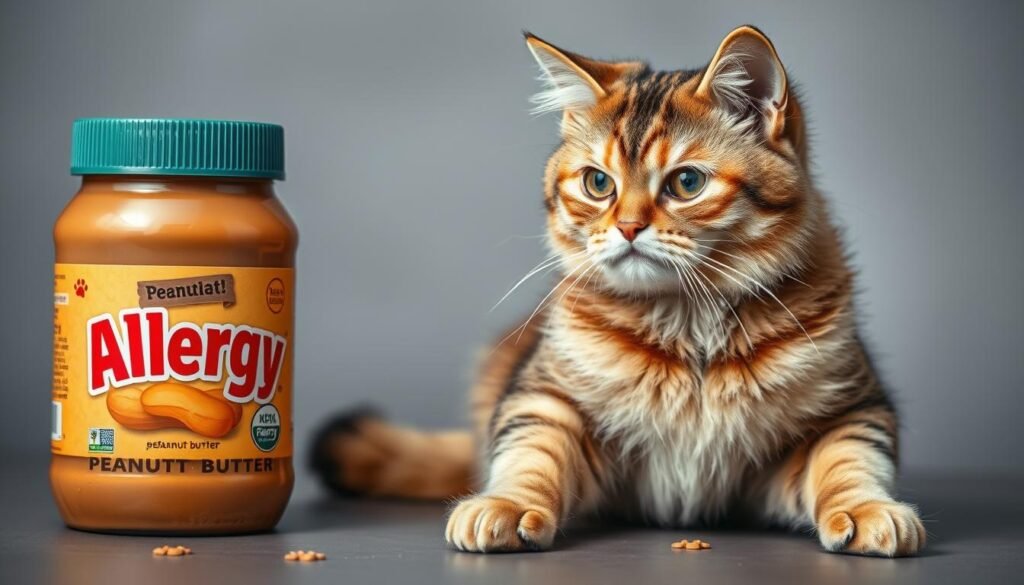
Peanut allergies in cats are not common, but they can occur. By watching your cat closely, you can keep them safe from this treat’s risks.
Proper Portion Sizes and Frequency
Feeding cat peanut butter treats needs to be done with care. Experts say to give no more than half a teaspoon at a time. It’s best to limit these treats to no more than twice a week.
Even smaller amounts, like 1/8 to 1/4 teaspoon, are better for hiding medicine. Remember, peanut butter should not make up more than 10% of your cat’s daily calories. For a cat eating 250 calories a day, treats should have 25 calories or less.
Recommended Serving Guidelines
- Limit peanut butter treats to no more than 1/2 teaspoon per serving
- Offer peanut butter treats no more than twice a week
- Use even smaller portions, around 1/8 to 1/4 teaspoon, when hiding medications
Weekly Limitations
To keep your cat’s diet balanced, don’t overdo it with peanut butter treats. They should not make up more than 10% of your cat’s daily calories. For a cat eating 250 calories a day, that’s about 25 calories or less per week.
| Metric | Value |
|---|---|
| Average Daily Calorie Intake for Cats | 200-300 calories |
| Caloric Content per Tablespoon of Peanut Butter | 94 calories |
| Recommended Peanut Butter Treat Limit (10% of Daily Intake) | 25 calories or less per week |
By sticking to these guidelines, your cat can enjoy cat peanut butter treats now and then. This way, they stay healthy and get a balanced diet.
Using Peanut Butter for Medication Administration
Giving medication to cats can be tough. But, peanut butter can help in some cases. It’s not a good treat for cats, but it can hide pills for hard-to-medicate cats.
Use only a small amount of peanut butter, about 1/8 to 1/4 teaspoon. This small amount can make your cat eat the pill. But, make sure the peanut butter doesn’t have xylitol, which is bad for cats.
Always talk to your vet before trying this. They can tell you if peanut butter is safe with your cat’s medicine. They’ll also guide you on how much to use and how often.
| Pros | Cons |
|---|---|
|
|
Using peanut butter for hiding medication is just a temporary fix. Always work with your vet to keep your cat safe and healthy.
“Always consult with your veterinarian before using peanut butter or any other food to administer medications to your cat.”
Choosing Safe Peanut Butter Products
Feeding your cat the right peanut butter is key. Cats can have a little peanut butter as a treat. But, not all peanut butters are safe for them. It’s important to pick cat-friendly peanut butter without harmful additives.
Reading Labels Effectively
When picking safe peanut butter for cats, read the label well. Choose products with just peanuts. Stay away from peanut butters with sugar, salt, preservatives, or other nuts. The best is unsalted, raw peanut butter with no extra ingredients.
Best Brands for Cats
Opt for organic, natural peanut butter brands for cats. Look for high-quality, minimally processed peanuts. Some good brands include:
- Crazy Richard’s Peanut Butter
- MaraNatha Organic Peanut Butter
- Smucker’s Natural Peanut Butter
- Wild Friends Organic Peanut Butter
Even with these safer options, give peanut butter to cats in small amounts. Watch how they react and adjust the amount to keep them healthy.
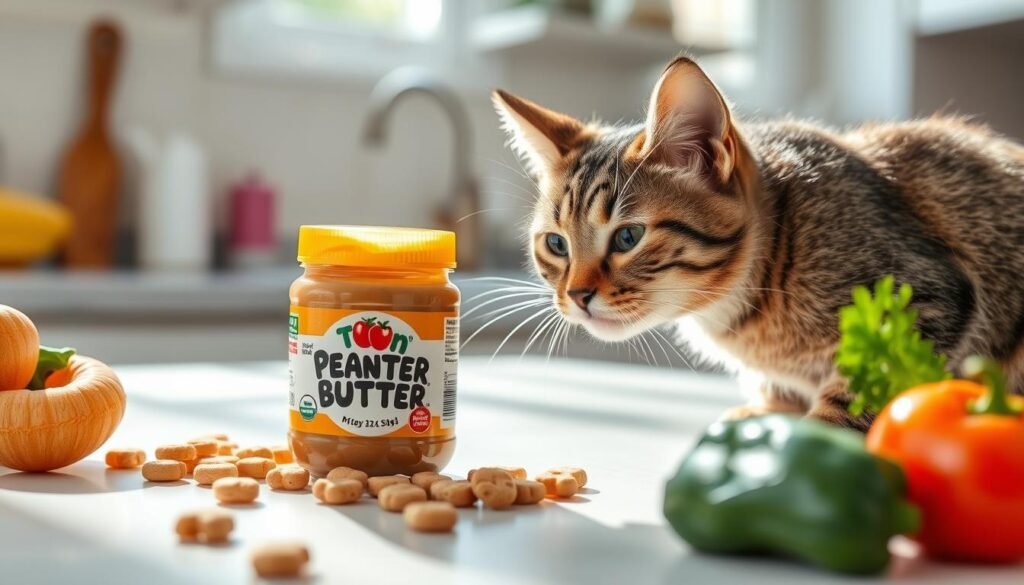
Healthy Alternatives to Peanut Butter
Peanut butter might look tempting for your cat, but it’s not the best choice. Cats need certain nutrients found in animal proteins. So, plant-based foods like peanut butter should be given sparingly.
Here are some cat treat alternatives and healthy cat snacks that are better for your cat:
- Small pieces of cooked, boneless chicken or fish
- Commercially available cat treats, made specifically for feline nutritional requirements
- Bite-sized portions of cat-safe fruits and vegetables, such as cooked carrots, pumpkin, or small amounts of berries
Always introduce new foods slowly and in small amounts. Talk to your vet to find the best healthy cat snacks for your cat. This will depend on their health and what they need to eat.
Treats should not make up more than 10% of your cat’s calories. A good diet of quality cat food, with the occasional healthy treat, is best. This keeps your cat happy and healthy.
When to Consult Your Veterinarian
Feeding your cat peanut butter needs a vet’s okay first. Cats can have peanut butter in small amounts safely. But, cats with health issues need special care.
Diabetes, obesity, kidney problems, or other health issues mean you should talk to your vet. They can tell you if peanut butter is safe for your cat’s diet.
Watch for signs of an allergic reaction like vomiting or trouble breathing after peanut butter. Peanut butter can also cause xylitol poisoning, which is very dangerous. Always check the peanut butter ingredients.
Regular vet visits are key to keeping your cat’s diet right. Your vet can guide you on how much peanut butter is okay. They can also suggest safer treats if needed.
It’s wise to be cautious with cat peanut butter concerns and veterinary advice cats peanut butter. Talking to your vet ensures your cat stays healthy and happy.
Conclusion
Cats can eat a little peanut butter, but it’s not good for them as a regular treat. It doesn’t give them any special health benefits. Instead, it can lead to problems like obesity, allergies, and upset stomachs.
It’s best to feed your cat a diet made just for them. This means avoiding foods like peanut butter that are too fatty and salty. This keeps your cat healthy and happy.
The cat peanut butter safety guide tells us to be careful. Always check the labels and talk to a vet before giving peanut butter to your cat. If you do give it to them, just a tiny bit is okay. But, there are better treats out there, like plain cooked meat, that are safer and healthier.
In the end, while peanut butter might seem like a tasty treat, it’s not the best choice for your cat. Focus on what’s best for their health and talk to your vet. This way, your cat can live a long, happy life without the risks of peanut butter and other bad foods.
